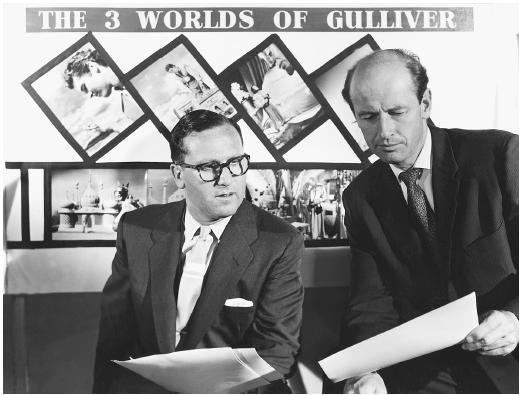Charles Schnee - Writer
Writer and Producer. Nationality: American. Born: Bridgeport, Connecticut, 6 August 1916. Education: Attended Yale University, New Haven, Connecticut, B.A.; Yale Law School, LL.B. Career: Lawyer; 1943—author of play, Apology ; 1947—first film as writer, I Walk Alone ; 1953–57—producer and production executive; then returned to writing. Award: Academy Award for The Bad and the Beautiful , 1952. Died: In 1963.
Films as Writer:
- 1947
-
I Walk Alone (Haskin); Cross My Heart (Berry)
- 1948
-
They Live by Night ( The Twisted Road ) (Ray); Red River (Hawks) (co)
- 1949
-
Scene of the Crime (Rowland); Easy Living (Tourneur)
- 1950
-
Paid in Full (Dieterle) (co); The Next Voice You Hear (Wellman); The Furies (A. Mann); Right Cross (J. Sturges); Born to Be Bad (Ray)
- 1951
-
Bannerline (Weis); Westward the Women (Wellman)
- 1952
-
When in Rome (Brown) (co); The Bad and the Beautiful (Minnelli)
- 1960
-
Butterfield 8 (Daniel Mann); The Crowded Sky (Pevney)
- 1962
-
Two Weeks in Another Town (Minnelli)
Films as Producer:
- 1953
-
Torch Song (Walters); Jeopardy (J. Sturges)
- 1955
-
The Prodigal (Thorpe); Trial (Robson)
- 1956
-
Somebody up There Likes Me (Wise)
- 1957
-
The Wings of Eagles (Ford); House of Numbers (Rouse); Until They Sail (Wise)
Publications
On SCHNEE: articles—
Présence du Cinéma (Paris), June 1962.
Film Comment (New York), Winter 1970–71.
Film Comment (New York), January-February 1981.
* * *
Charles Schnee's early death (at the age of 47) prevented him from becoming one of Hollywood's most famous names, although his abilities as screenwriter (an Oscar-winner for The Bad and the Beautiful ) and producer ( Somebody Up There Likes Me , The Wings of Eagles ) had already been proved. His relatively small list of films is distinguished enough to make a thorough analysis of his work worthwhile, but since he had only just established himself as a producer when he died, it is as a screenwriter he is best remembered.
Most of Schnee's films seem to be unselfconscious updatings of old genres, presenting the values and concerns of the postwar world. However, his scripts, by his own definition, stressed character rather than genre. Although he wrote three successful westerns ( Red River , The Furies , and Westward the Women ), his work is perhaps best grouped under the general definition of "stories about people under the stress of transition." This transition might be social, physical, political, economic, or emotional, as Schnee, originally trained as a lawyer, could bring his remarkable attention to detail and keen powers of observation to many different kinds of settings. For instance, Schnee's first screenplay, I Walk Alone , is a look at gangsters in the nightclub business. Instead of the typical rough bootleggers of the 1930s, these hoods are big businessmen, and when one of their former group (Burt Lancaster) gets out of prison, he is clearly anachronistic in the new, more polished world of crime. He must make a transition from his old ways to the new, or die. They Live

Schnee's best work tends to be melodrama, and even his westerns reflect that tendency. Setting aside Red River , which was largely written by Borden Chase, the other two Schnee westerns are films in which women are central to the story: The Furies and Westward the Women . Both are superior, underrated films with strong stories and performances, well directed by Anthony Mann and William Wellman, respectively. In the former, Barbara Stanwyck struggles to take control of her life and her inheritance, attempting to wrestle it from her more backward looking father. In the latter, a motley group of women, the downtrodden and the outcast, set out on a wagon trek west to find new homes, new lives, and new husbands. Although both films contain conventions of the western genre, and The Furies is also a film noir and Westward the Women a women's film, both are clearly melodramas.
Schnee's most famous screenplay is his Oscar-winner, The Bad and the Beautiful . Impeccably directed by Vincente Minnelli, its story is a perfectly balanced presentation on the Hollywood collaborative force. Three artists—director, writer, and star—are carefully manipulated and controlled by a producer, who orchestrates the transitional moment in each of their lives in order to further his own career. As the film begins, he is in his own crisis of transition, and each of the three stories is told in flashback, in an attempt to convince each that the manipulation had actually been to their own advantage. Like all Minnelli films, it tends to be about art and the act of creating art, and it is unquestionably Minnelli's film. However, Schnee's contribution to both this and Minnelli's companion piece, Two Weeks in Another Town , cannot be discounted.
Schnee's collection of screenplays taken together seem to present the postwar world—more corporate, less individualistic, less mythic, less reassuring, and with its values all in question. Thus his stories of people in various forms of transition mark him as an important postwar talent whose best contributions may well have been ahead of him at the time of his death.
—Joanne Yeck
Comment about this article, ask questions, or add new information about this topic: